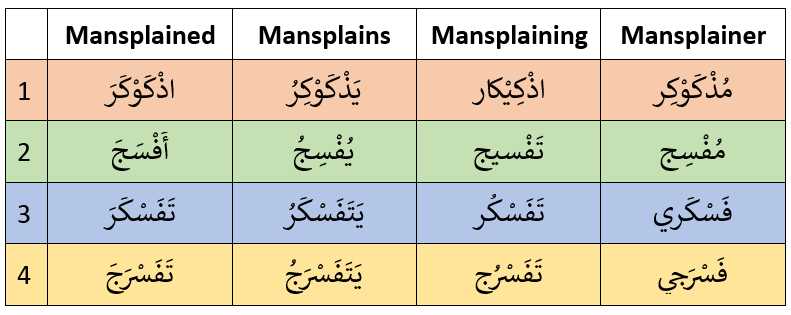A couple of weeks ago I put two proposed #Arabic translations of #mansplaining to the vote. I also asked for other suggestions. A summary of the points raised and my own thoughts in this thread, with another poll at the end. https://twitter.com/MariamAboelezz/status/1292782161993637888">https://twitter.com/MariamAbo...
First, I should point out that there is a number of different translations already floating around. I did not put them to the vote because I did not feel they were adequate, mainly because they already have other connotations. These include تفسير ذكوري and أستذة.
The majority of votes and comments favoured a solution involving the coining of a new word, with a bias for portmanteaus. Top suggestions were:
@QifaNabki اذكوكر
@hanannasser فسكر
@tafsirdoctor also pointed me to أفسج by @comicskilljoy https://twitter.com/deenasabry/status/1145709207800418304?s=20">https://twitter.com/deenasabr...
@QifaNabki اذكوكر
@hanannasser فسكر
@tafsirdoctor also pointed me to أفسج by @comicskilljoy https://twitter.com/deenasabry/status/1145709207800418304?s=20">https://twitter.com/deenasabr...
The solution of coin for coin and portmanteau for portmanteau is the most lucrative: it seems like the only way to cover the full range of parts of speech (mansplain/er/ing) without having to change the core word in Arabic, and without invoking inaccurate meanings.
But coining words in Arabic is subject to restrictions: ideally, they should not exceed 4 root consonants for the morphological pattern to come intuitively to speakers. In the same vein, for a portmanteau to work, it should contain enough of the composite words to invoke them.
How words sound is also important. From a psycholinguistic perspective, meaning-making involves activating words that are both semantically and phonologically related. In the case of unfamiliar words, phonology carries greater weight.
With this in mind, I amended فسكر and فسرج to تفسكر and تفسرج (verb form IIq). I will present my case for the following four proposed coinages before putting them to the vote.
Option 1 - اذكوكر
 https://abs.twimg.com/emoji/v2/... draggable="false" alt="➕" title="Fettes Pluszeichen" aria-label="Emoji: Fettes Pluszeichen">Not a portmanteau like the others, but a bona fide morphological form (XII) of ذكر, the root for male as well as mention, recall
https://abs.twimg.com/emoji/v2/... draggable="false" alt="➕" title="Fettes Pluszeichen" aria-label="Emoji: Fettes Pluszeichen">Not a portmanteau like the others, but a bona fide morphological form (XII) of ذكر, the root for male as well as mention, recall
 https://abs.twimg.com/emoji/v2/... draggable="false" alt="➖" title="Dickes Minuszeichen" aria-label="Emoji: Dickes Minuszeichen">Does not roll off the tongue
https://abs.twimg.com/emoji/v2/... draggable="false" alt="➖" title="Dickes Minuszeichen" aria-label="Emoji: Dickes Minuszeichen">Does not roll off the tongue
 https://abs.twimg.com/emoji/v2/... draggable="false" alt="➖" title="Dickes Minuszeichen" aria-label="Emoji: Dickes Minuszeichen">This verb form conveys gaining/feigning a quality; can be understood as & #39;becoming more masculine& #39;
https://abs.twimg.com/emoji/v2/... draggable="false" alt="➖" title="Dickes Minuszeichen" aria-label="Emoji: Dickes Minuszeichen">This verb form conveys gaining/feigning a quality; can be understood as & #39;becoming more masculine& #39;
Option 2 - أفسج
 https://abs.twimg.com/emoji/v2/... draggable="false" alt="➕" title="Fettes Pluszeichen" aria-label="Emoji: Fettes Pluszeichen">in the phonological region of أفسد (corrupted) which invokes the negative connotation
https://abs.twimg.com/emoji/v2/... draggable="false" alt="➕" title="Fettes Pluszeichen" aria-label="Emoji: Fettes Pluszeichen">in the phonological region of أفسد (corrupted) which invokes the negative connotation
 https://abs.twimg.com/emoji/v2/... draggable="false" alt="➖" title="Dickes Minuszeichen" aria-label="Emoji: Dickes Minuszeichen">Not a clear portmanteau: 3 root consonants come from first 2 letters of فسر and middle letter of رجل.
https://abs.twimg.com/emoji/v2/... draggable="false" alt="➖" title="Dickes Minuszeichen" aria-label="Emoji: Dickes Minuszeichen">Not a clear portmanteau: 3 root consonants come from first 2 letters of فسر and middle letter of رجل.
 https://abs.twimg.com/emoji/v2/... draggable="false" alt="➖" title="Dickes Minuszeichen" aria-label="Emoji: Dickes Minuszeichen">Form IV not followed throughout: تفسيج should be إفساج
https://abs.twimg.com/emoji/v2/... draggable="false" alt="➖" title="Dickes Minuszeichen" aria-label="Emoji: Dickes Minuszeichen">Form IV not followed throughout: تفسيج should be إفساج
Option 3 - تفسكر
 https://abs.twimg.com/emoji/v2/... draggable="false" alt="➕" title="Fettes Pluszeichen" aria-label="Emoji: Fettes Pluszeichen">balanced portmanteau: first 2 letters of فسر + last 2 of ذكر
https://abs.twimg.com/emoji/v2/... draggable="false" alt="➕" title="Fettes Pluszeichen" aria-label="Emoji: Fettes Pluszeichen">balanced portmanteau: first 2 letters of فسر + last 2 of ذكر
 https://abs.twimg.com/emoji/v2/... draggable="false" alt="➕" title="Fettes Pluszeichen" aria-label="Emoji: Fettes Pluszeichen">activates a number of phonologically related words which are ALSO semantically related: يتفلسف، يتمنظر، يتمسخر، يتفشخر
https://abs.twimg.com/emoji/v2/... draggable="false" alt="➕" title="Fettes Pluszeichen" aria-label="Emoji: Fettes Pluszeichen">activates a number of phonologically related words which are ALSO semantically related: يتفلسف، يتمنظر، يتمسخر، يتفشخر
Option 4 - تفسرج
 https://abs.twimg.com/emoji/v2/... draggable="false" alt="➕" title="Fettes Pluszeichen" aria-label="Emoji: Fettes Pluszeichen">good portmanteau: all letters from فسر and first 2 from رجل, with transitional letter in common
https://abs.twimg.com/emoji/v2/... draggable="false" alt="➕" title="Fettes Pluszeichen" aria-label="Emoji: Fettes Pluszeichen">good portmanteau: all letters from فسر and first 2 from رجل, with transitional letter in common
 https://abs.twimg.com/emoji/v2/... draggable="false" alt="➕" title="Fettes Pluszeichen" aria-label="Emoji: Fettes Pluszeichen">Also activates some related words, e.g. يتبهرج but not as many as تفسكر
https://abs.twimg.com/emoji/v2/... draggable="false" alt="➕" title="Fettes Pluszeichen" aria-label="Emoji: Fettes Pluszeichen">Also activates some related words, e.g. يتبهرج but not as many as تفسكر
The words تفسكر and تفسرج don& #39;t roll off the tongue as well as their form Iq counterparts (فسكرة and فسرجة) but I believe that& #39;s a cost worth paying for the relevant meanings that the reflexive ت in form IIq helps activate.
Note that I didn& #39;t use the active participle for mansplainer, but opted for the adjectival construction instead because it activates relevant words such as فهلوي & فنجري. In the case of فسكري, عسكري (military) is a bonus.
I thank @raedaljishi for the idea https://twitter.com/raedaljishi/status/1293715489710112770?s=20">https://twitter.com/raedaljis...
I thank @raedaljishi for the idea https://twitter.com/raedaljishi/status/1293715489710112770?s=20">https://twitter.com/raedaljis...
And now, kind Arabists of twitter, I ask you to cast your vote once more! What is your preferred #Arabic #translation of #mansplaining?

 Read on Twitter
Read on Twitter


